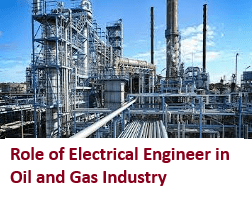
The electrical engineer plays a critical role in the oil and gas industry, ensuring the safe, efficient, and reliable operation of electrical systems and systems across exploration, production, refining, and distribution stages.
They ensure compliance with safety and industry standards while supporting automation, instrumentation, and energy efficiency initiatives. Electrical engineers also conduct system analysis, troubleshoot faults, and supervise commissioning activities. Their expertise is crucial for minimizing downtime, enhancing operational performance, and integrating modern technologies to support sustainable and cost-effective energy production.
They manage emergency power systems, conduct risk assessments, and ensure compliance with industry regulations to prevent electrical hazards in high-risk environments. Their expertise is crucial for minimizing downtime, enhancing operational safety, and integrating renewable energy solutions, making them indispensable in maintaining the industry’s complex electrical infrastructure.
They design and maintain power distribution networks, hazardous area equipment, and control systems for drilling rigs, refineries, and pipelines while adhering to strict safety standards like ATEX, IECEx, and NEC. Their responsibilities include selecting explosion-proof components, optimizing energy efficiency, troubleshooting electrical faults, and implementing automation solutions like SCADA and PLCs.
Role of Electrical Engineer in Oil and Gas Industry
Power System Design
Design electrical power systems for offshore platforms, onshore plants, pipelines, and refineries.
Specify transformers, switchgear, circuit breakers, and protection relays for high-voltage (HV) and low-voltage (LV) systems.
Ensuring reliable and continuous power supply to critical operations such as drilling rigs, pumps, compressors, and control systems.
Performing load flow studies, fault analysis, and grounding design to maintain safety and stability. Ensure compliance with IEEE, IEC, NEC, API, and ATEX/IECEx standards.
Control, Automation & Instrumentation
Integrating with SCADA, DCS, and PLC systems to support automated operation of oil and gas processes.
Collaborating with instrumentation engineers for seamless control and monitoring.
Integrate motor control centers (MCCs), VFDs (Variable Frequency Drives), and soft starters for pumps & compressors.
Troubleshoot process automation systems for drilling, production, and refining.
Implement Industrial IoT & digitalization for predictive maintenance.
Electrical Equipment Maintenance and Troubleshooting
Conducting preventive and predictive maintenance to minimize downtime and failures.
Diagnosing and resolving electrical faults and supporting emergency repairs in critical systems.
Conduct thermographic inspections, partial discharge testing, and power quality analysis.
Troubleshoot grounding & lightning protection systems in harsh environments.
Manage cathodic protection systems for pipelines to prevent corrosion.
Safety and Fire area investigation
Designing systems to meet intrinsically safe and explosion-proof standards in hazardous zones.
Implementing electrical safety procedures, including arc flash studies and ensuring proper earthing/grounding.
Classify zones for flammable gas & dust environments.
Select explosion-proof (Ex d), flameproof, intrinsically safe (Ex i), and pressurized (Ex p) equipment.
Ensuring regulatory compliance with local and international codes (e.g., OSHA, NEMA).
Conduct fire preventive training in company employee.
Equipment Selection and Specification
Selecting the right electrical equipment in oil & gas requires a balance of safety, reliability, efficiency, and compliance. Engineers must consider hazardous area classifications, environmental factors, and industry standards to mitigate risks and optimize performance.
Selecting and specifying electrical equipment like motors, drives, generators, UPS, and VFDs (Variable Frequency Drives) based on process requirements.
Ensuring compliance with industry standards like IEC, IEEE, NEC, API, and ATEX/IECEx for hazardous areas.
Project Management & Coordination
Working with multidisciplinary teams (civil, mechanical, instrumentation) to ensure electrical systems align with overall project objectives. Oversee EPC (Engineering, Procurement, Construction) projects for electrical systems.
Managing budgets, timelines, and vendor coordination for electrical scopes of work. Coordinate with mechanical, instrumentation, and process engineers for seamless integration.
Manage budget, timelines, and contractor work for electrical installations.
Energy Efficiency and Sustainability
Identifying opportunities to reduce energy consumption, optimize system performance, and support sustainability goals.
Introducing renewable energy sources (e.g., solar for remote sites) where applicable.
Renewable Energy & Decarbonization Initiatives
Integrate solar, wind, and energy storage to reduce carbon footprint.
Support electrification of offshore platforms to minimize diesel dependency.
Implement energy recovery systems (waste heat to power).

electricalsphere.com
electricalsphere.com
Role of Electrical Engineer in Oil and Gas Industry
Role of Electrical Engineer in Oil and Gas Industry
Hi electricalsphere.com owner, Your posts are always well received by the community.
Thanks for Appreciation, Please share my website to your social group
Hello electricalsphere.com administrator, Keep sharing your knowledge!
Ok. Please share my website to your social group
Hi electricalsphere.com administrator, Your posts are always well-cited and reliable.
Thanks for Appreciation, Please share my website to your social group
To the electricalsphere.com admin, Thanks for the well-structured and well-presented post!
Thanks for Appreciation, Please share my website to your social group
Hello electricalsphere.com administrator, Your posts are always well-written and easy to understand.
Thanks for Appreciation, Please share my website to your social group
To the electricalsphere.com administrator, You always provide useful information.
Dear electricalsphere.com webmaster, Your posts are always well-received by the community.
Một trong những yếu tố quan trọng nhất để đánh giá uy tín của một nhà cái trực tuyến là các giấy phép hoạt động. 66b online tự hào sở hữu các giấy phép do các tổ chức có thẩm quyền cấp, đảm bảo tính hợp pháp và minh bạch trong mọi hoạt động của mình. TONY12-26